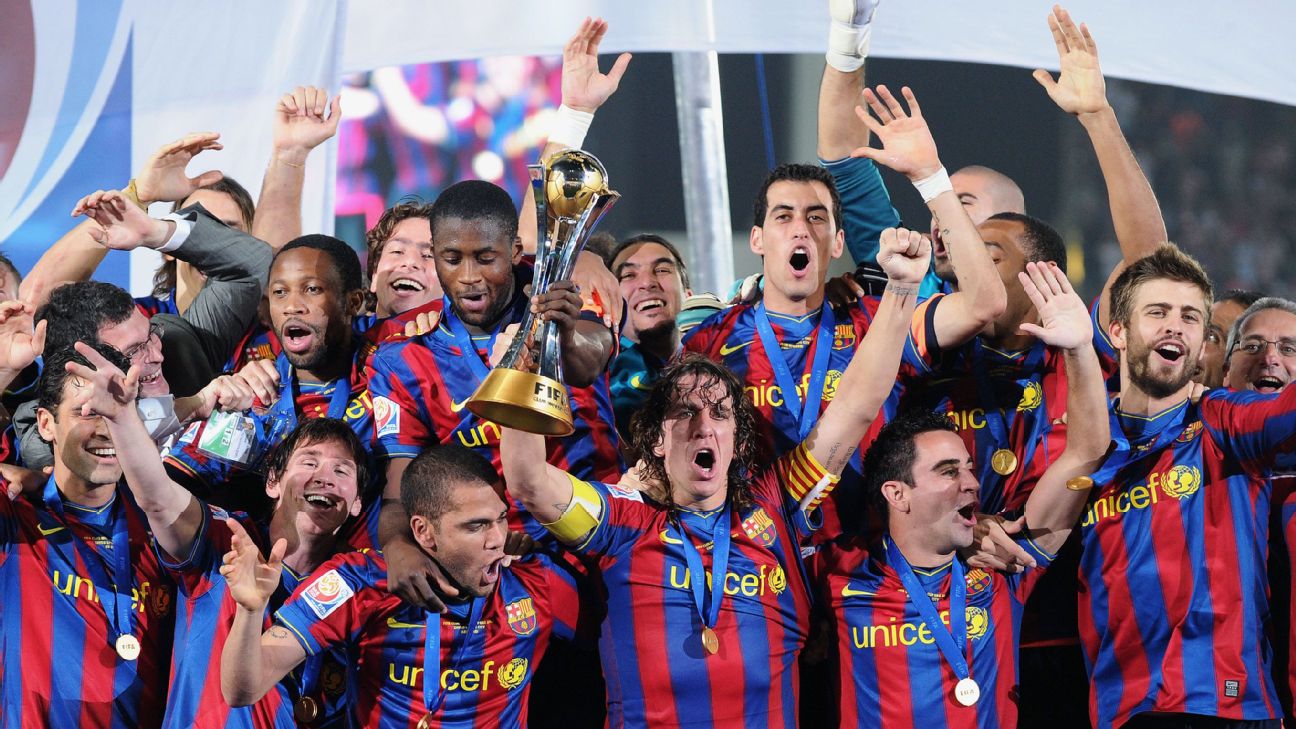Products You May Like
It’s been 10 years since Barcelona ended 2009 with a record-breaking haul of six trophies, which also means it’s been exactly 10 years since the Spanish giants were almost upset in the Club World Cup final by Argentina’s Estudiantes de La Plata.
With the game about to head into stoppage time, the Argentine side led 1-0 in Abu Dhabi. But then, with a goal that carried no hallmarks of the style of football synonymous with Pep Guardiola’s Barca, Pedro got on the end of makeshift forward Gerard Pique’s header to take the game to extra time. Lionel Messi then scored the winner with his chest in the 110th minute. It was the sixth title of a historic year for the Catalans as well as their first-ever Club World Cup triumph.
– FC 100: ranking the best soccer players in the world
– Defence, not goals, made Clasico a classic
For Barcelona, the year 2009 was one of fine margins and late goals: Andres Iniesta’s dramatic winner at Stamford Bridge in the Champions League semifinal, Pedro’s extra-time winner in the European Super Cup, Jose Pinto’s penalty save against Mallorca en route to the Copa del Rey final. However, it was also a year of great swagger and bold statements of intent. Guardiola’s side were taking to the game to new levels — a thumping 6-2 win away at Real Madrid testament to that — and Messi, with a supporting cast of passing masters, was emerging as the game’s best player.
ESPN spoke to the people involved in that incredible year. From players Dani Alves and Pedro to goalkeeping coach Juan Carlos Unzue and from president Joan Laporta to Club World Cup final rivals Juan Sebastian Veron and Alejandro Sabella, this is the oral history of Barcelona’s 2009.
How this Barca side came together
Guardiola’s took his first steps in coaching 2007 with Barca’s B team. After earning promotion from the fourth tier of Spanish football, he was unexpectedly handed the first team job in 2008. It set the stage for a remarkable period in the club’s history.
Dani Alves joined Barcelona in 2008 from Sevilla for €32 million, which made him the third-most expensive defender at the time. He won 23 trophies with the club including five league titles and three Champions League crowns before leaving in June, 2016. He was also one of Guardiola’s first signings as Barca manager.
Alves: What was the best thing? I think the unity of this group. It was brutal. The worst? Nothing.
I don’t want to get into it too much because it’s a sensitive issue for Barca fans, but I think the great success of Barca is a fusion of two things. It’s not just La Masia [Barcelona’s prolific youth academy] that makes Barca so great. It’s a mix, with La Masia as the base and foreign players providing the support.
Joan Laporta was Barcelona president from 2003-10. During his tenure, the Catalan club won 4 La Liga titles, two Champions League and one Copa del Rey.
Laporta: We’re not going to be disrespectful about the opposition but it was a season in which we knew we were going to win. And sometimes we would ask: how many goals are we going to score today? If we conceded we always had absolute confidence that we would score one or two more and turn things around. There was a lot of certainty in our way of playing. It was a show. It was ballet. For me, the most important thing is how we played. It was a football machine.
Obviously I thought it would go well but the reality exceeded all expectations because… I think it was the best Barça side ever. Those trophies, just as with the victories and the trophies in recent seasons, cannot be understood without Leo Messi, with Leo as the leader.
Pedro was a Barcelona forward from 2008-15. The Spaniard was promoted from the second team to the first team by Guardiola and in 2009, he became the only Spanish player who has scored at least one goal in the six official club competitions during the same season.
Pedro: We got to a point where we’re going to play a final and we were all already thinking we were going to win it before playing. [Winning finals] is not easy in sports, but we could feel that domination we had on the pitch and the respect the rivals had for us, which also played into our favour. We had a lot of confidence.
Coinciding with a group of players that will never be repeated, like Xavi, Andres Iniesta, Messi, Dani Alves. It was a very strong team, too, really competitive. Then the idea that Pep had and that we carried out to perfection on the pitch. You could see how we dominated [games] that everything came off. You feel that domination when you’re on the pitch and the opposition even say to you how much they struggle when they’re playing against Barcelona.
For me, to play with Leo, with players that unique and to be able to go through that golden era with Pep as coach… I think that the football that we saw, that domination, such attractive football, it’s difficult for that to happen again.
Juan Carlos Unzue was Barcelona’s goalkeeper coach, 2003-10, and one of Guardiola’s advisers during the run to six titles in 2009.
Unzue: When the opposition speaks about you in that way, it’s because there is fear that what happened is happening in the background. And possibly, at that moment, no one imagined that it was a team that was going to win everything. That, in a certain way, ends up making you stronger. In a certain way, you sense that.
We did something so simple yet so complicated, which is to pick a majority of players who know the club like no-one else, and the pros and the cons that come with it. Now we’re talking about Pedrito, [Sergio] Busquets, Xavi, Andres Iniesta. OK, maybe in the case of Victor [Valdes] or Iniesta or Xavi it was the perfect moment, with games already behind them which meant the team could work really quickly. Pedro and Busquets were added to that core, coming from the third division.
Guardiola had faith in them because he knew them and he had confidence that they were able to give what was needed, in terms of expectations and the obligation at this club to win. [Guardiola] also transmitted his ideas to those that came from outside really quickly.
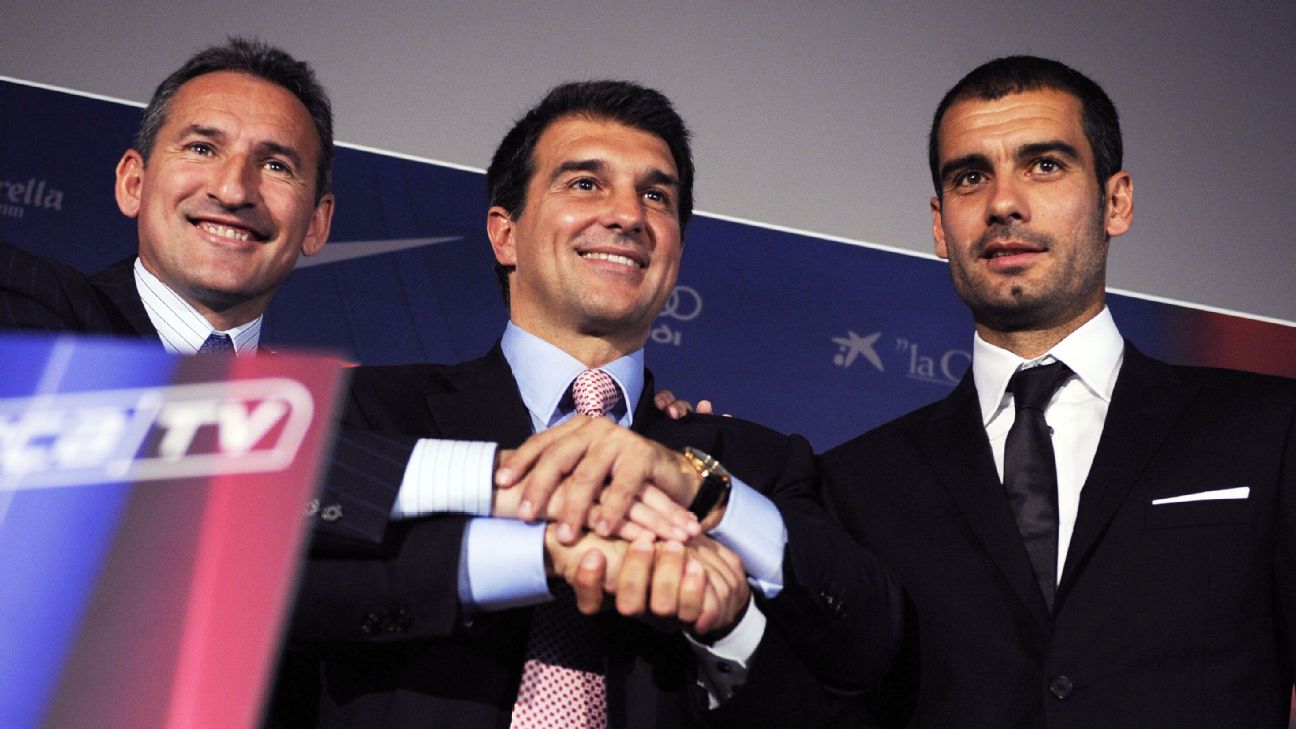
Guardiola hits the ground running as manager
At the start of the 2008-09 season, few could have imagined what was about to unfold at Camp Nou. President Joan Laporta’s decision to replace stale coach Frank Rijkaard with the untested Guardiola raised eyebrows both inside and outside the club. More confusion came when star player Ronaldinho was allowed to leave, joining AC Milan in June after Laporta said publicly that the Brazilian “needed a new challenge.”
Alves: He arrived with very clear ideas about what he wanted and how he could help us so that we could do what we did. I think in part [the success of the team] was because of Pep because a lot of it started with the relationship between the players. He got us together, he didn’t allow phones, we couldn’t spend all day in a parallel universe. He tried to avoid that.
It was a moment when we needed to live together, to interact with each other so that there was fluidity [between us] because at the end of the day, that’s what you need on the pitch. The better friends you are off the pitch, the more like brothers you are on it. That’s a basic rule.
Laporta: At that moment we needed to start a new cycle and I felt that he was the right person. He was with Barca B. The first reason I would give is that Pep loves Barca. He’s a Barcelona fan at heart. After that, I had a reference from Rafael Yuste, who was following Barca B. He was one of the directors who was very close to me and we had a good friendship. He told me Pep was ready and that he was a hard-worker, someone that arrived first and was the last to leave. Then I consulted with Johan [Cruyff, Barca legend as player and manager] and Txiki [Begiristain, Barca director of football 2003-10, now at Manchester City], telling them that I was thinking Pep could be the new Barca coach. They told me he was absolutely ready.
To tell you the truth, with the majority of the media and even some members of my board — fortunately a minority — thinking about Mourinho, I wanted to surprise people [by appointing] a person that thoroughly knew and had participated in Cruyff’s philosophy, which incorporates the genuine style of football which our model is based on. Straight away Mourinho’s people called me and were saying: “I suppose all this about you wanting Guardiola is not true and that you want Mourinho.” I told them: “Look, Mourinho’s a great professional, but I’ve decided on Pep Guardiola. I have a majority among the board. I know there are three or four that aren’t sure, which is respectable. I’m going to call a board meeting because this is a really important decision for me.”
I only had two coaches [as Barcelona president]. Rijkaard, who did an extraordinary job, and Guardiola, who achieved excellence. I said I wanted it to be a unanimous decision among the board. It took three meetings but in the end, we managed it: everyone in agreement on Pep. I knew it was going to be messy because the media were saying that if we were thinking of Pep, we were novices, that we hadn’t learned anything, that we were teenagers. I remember some of the headlines, that we’ve learned nothing after winning the league, the Champions League and Super Cups. That motivated me more. The feeling I had was that the more they said no, [the more] I wanted it to be a yes.
In his first press conference, on 17 June 2008, Guardiola even said he didn’t want Ronaldinho, Deco or Samuel Eto’o (although Eto’o finally stayed one more season) as he began working with this Barcelona team.
Unzue: In that first preseason, I realised that things were already going well. Firstly, because of [Guardiola’s] conviction in the message he sent from the off — fasten your seatbelts, we’re going to have a good time — and secondly because what I was seeing and hearing was new for me despite having been with the Dream Team for two years, with Rijkaard, winning the Champions League, La Liga and playing spectacular football. What I was seeing and hearing was different and something which I noticed was getting through to the players. He was capable of convincing the players. What Guardiola showed with time is that he knew how to adapt his discourse and his footballing nuances, what he wanted the players to execute, to the capacities of the players. Adapting to them.
Despite a lot of positivity around the club heading into the start of the 2008-09 season, Guardiola’s reign began with a 1-0 defeat at Numancia and a draw against Racing Santander.
Pedro: I remember they were tough moments, above all for Pep because he was under a lot of pressure. It’s true there was a lot of excitement at the start of Pep’s project. He’s a great coach. He had been a great player, as well as the image of Barcelona. I remember the nerves of those first two games. I even remember he told me that he was going to try and play me in case he didn’t continue. And look at what followed, everything he won and the era we had.
[As for how he handled Ronaldinho] I think [Guardiola] was always very clear on what he was going to do well, with the players he had, the dressing room… But it was also a difficult moment because there was a change, a transition. When important players like Ronaldinho leave Barca, it can be hard, but it’s true we then see the emergence of Leo, although he’d been doing well for a while, and [Pep built] a spectacular team that managed to win every possible trophy.
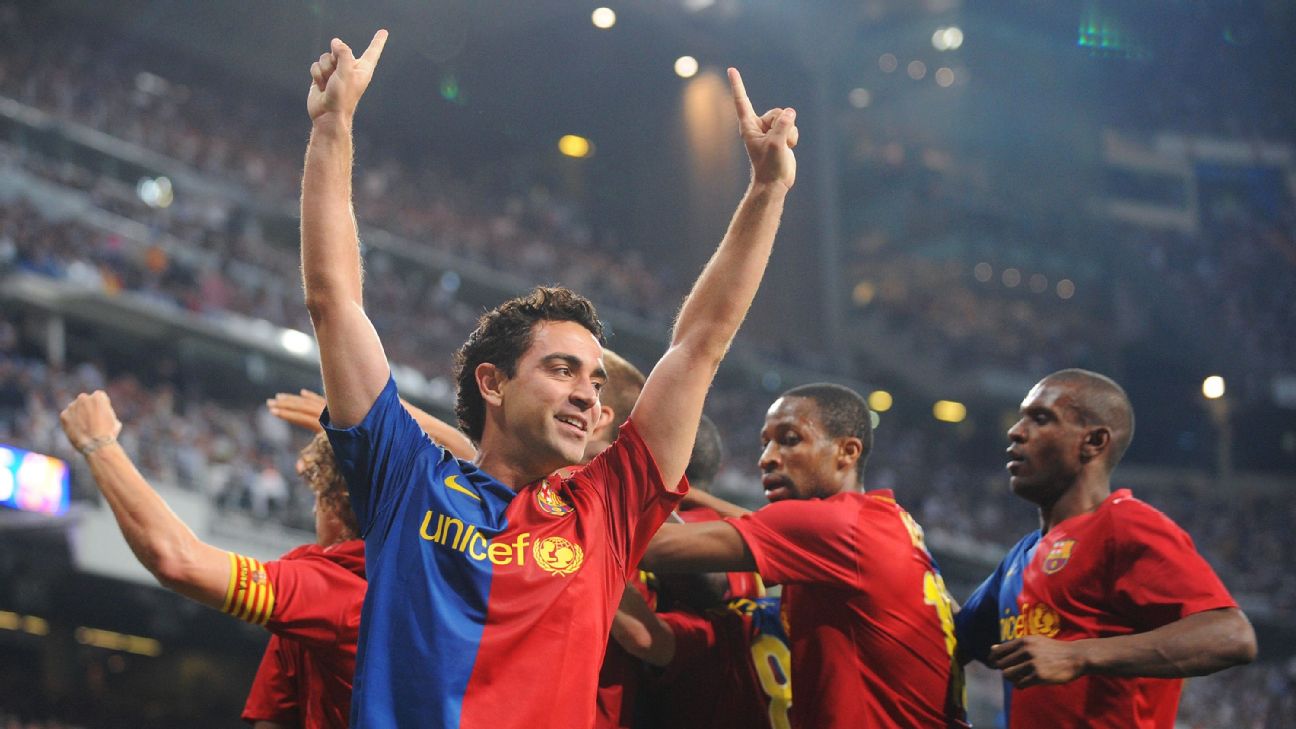
Unzue: Pep’s arrival came in the context of inconsistent results and the changes [like letting Ronaldinho leave] were justified. It’s a key moment. And the idea of maintaining the philosophy of the way of playing with a manager who played under Cruyff is vital in that change.
It’s associated with the arrival of Pep, yes, but it was more a decision — and I think it should be this way — made by the club, with everyone in agreement. It’s the only way to have success and to avoid the change of cycle being as abrupt as it is in the majority of cases. It was a decision taken on by Pep, as the head of the project, but everyone was convinced it was correct.
“If we didn’t win that game, I don’t think we would have won La Liga”
Heading into May, Barcelona were still alive in all three competitions: La Liga, the Copa del Rey and the Champions League. In the league, Real Madrid had won 17 of their last 18 league games to cut the gap on leaders Barca, the last side to beat them in La Liga, to four points with five matches to go. Any hope they had of catching Guardiola’s side, though, was extinguished by a staggering Barcelona performance at the Santiago Bernabeu. Thierry Henry and Lionel Messi helped themselves to two goals each in an incredible 6-2 win that effectively wrapped up the title, which they would eventually become their second of six trophies that year, after the Copa del Rey.
That Madrid match was also the first time Guardiola used Messi as false nine, a move that proved to be a masterstroke.
Laporta: As I went to a religious school, mortification is something I carry inside me. And it was a mortification filled with satisfaction because I think it was Madrid’s Community Day, which was May 2.
I had to behave: the truth is, every time we scored I was pinching the leg of the poor guy sat next to me. I think he was a minister. In any case, he took it very sportingly because he understood that it was a delight to be scoring (so many) goals at the Bernabeu. In addition, I will tell you something: if we didn’t win that game, I don’t think we would have won La Liga. And, for that reason, [we wouldn’t have won] the sextet, either. The win at the Bernabeu was [like] another trophy because it was a historic result, comparable with the 0-5 at the Bernabeu in La Liga in 73-74 with Johan [Cruyff] as a player.
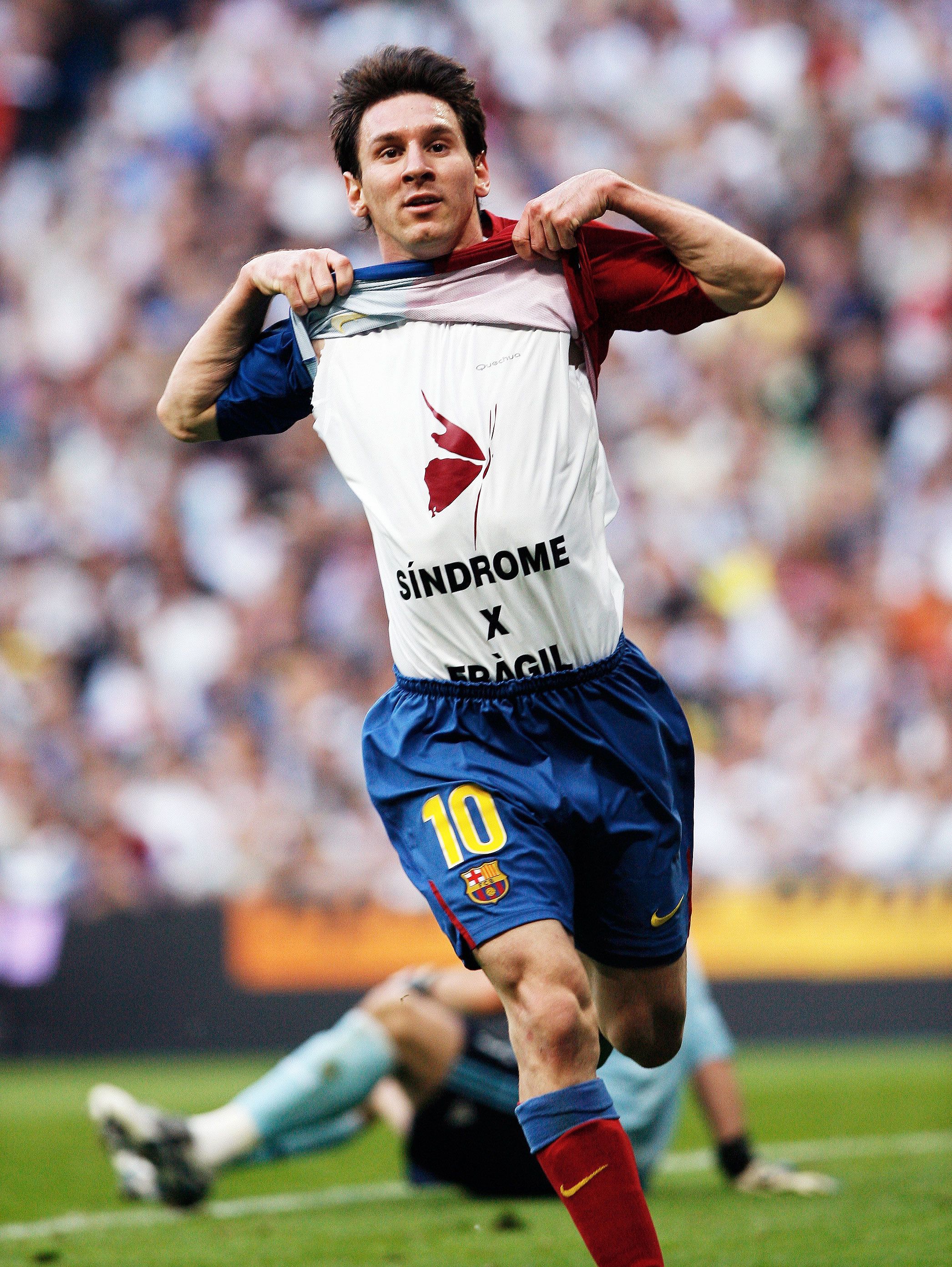
Pedro: That was the biggest game of the season because when you go to the Bernabeu, you’re always against a tough side. It’s a difficult place to win. There’s always a lot of tension around a Clasico and to get that result and, on top of that, to get it playing so well…. I think it was from that moment that you see the team playing at such a high level, you see that Guardiola’s orders are going to obtain really good results.
“A spectacular moment:” Iniesta’s goal at Stamford Bridge
Just four days after thumping Madrid, Barca faced Chelsea at Stamford Bridge on May 6 for a place in the Champions League semifinal. After a goalless draw at Camp Nou, Barca found themselves a goal down and a man down deep into stoppage time in London. Then, from nowhere, Iniesta appeared, leading to celebrations that statistics suggest led to a baby boom in Catalonia nine months later.
Alves: I think the fans that go to Camp Nou take pleasure in the most beautiful performances, more than the result itself.
Laporta: A terrible thing happened at Stamford Bridge. We went there with a result that meant if we didn’t score [we were out]. I went into the bathroom and I saw people from Chelsea cracking open bottles of champagne and celebrating because it was already in extra time. I was nervous. There were still three or four minutes to go. I returned and sat down because the directors [of the two teams] aren’t sat together there — [the Barca directors] were all together, though. And suddenly, when we scored, I jumped up, because you could celebrate it there and there was an avalanche of colleagues from the board. Others were half-frozen.
I don’t know who but someone grabbed me… if they didn’t I would have crashed down on to the pitch!
Pedro: Oof, I remember it really well. I remember it was a game that we were never ever going to win with how it went. To be honest, Chelsea were superior. They went ahead and we struggled to find spaces between the lines, to create chances. They were well-positioned. Then there’s the red card for [Barca defender Eric] Abidal. Things were against us but finally, just imagine, in an isolated play in the last minute, when Andres scores… I remember all of us on the bench running towards the corner to celebrate with Andres, with our fans who were there at Stamford Bridge. It was a spectacular moment.
We got to the final, which was our objective and closed a magnificent season.
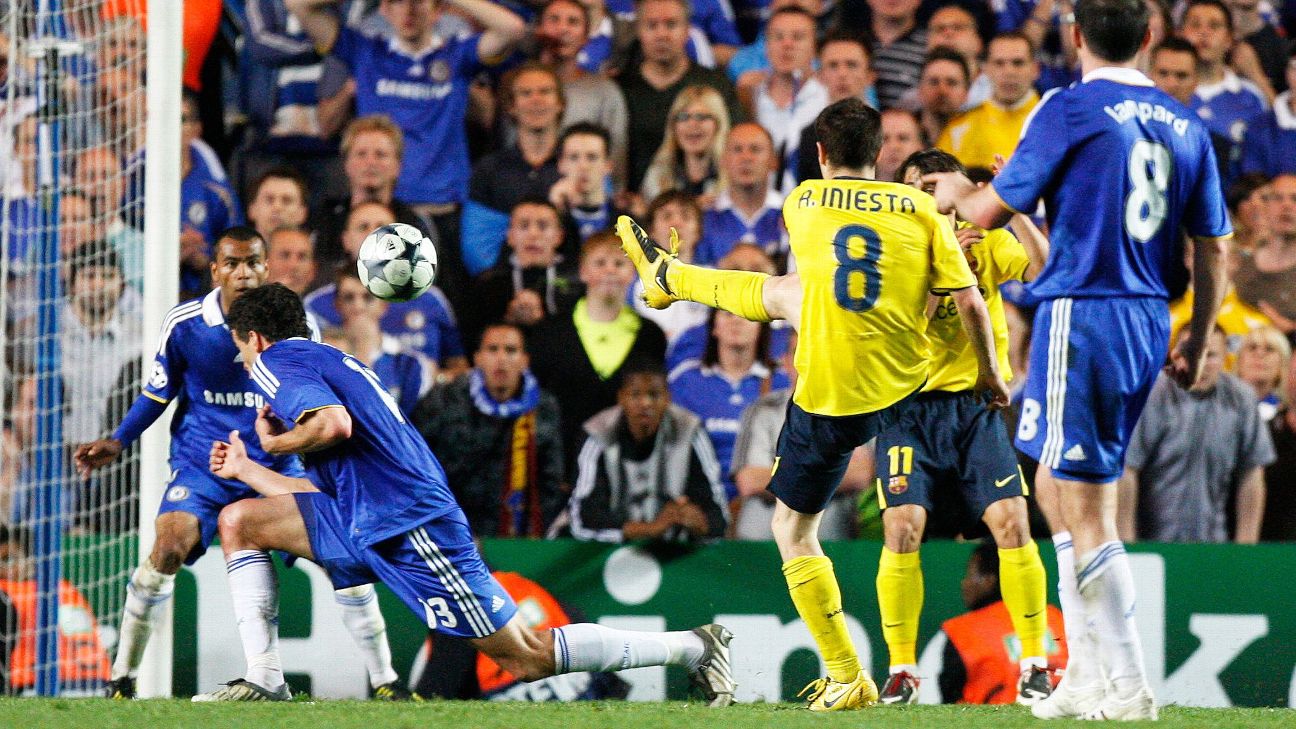
Unzue: I will never ever forget [the Iniesta goal]. I was outside the stadium when Iniesta scored, on the stairs, coming down from by the press box, which is where I watched the game that day. I couldn’t sit on the bench as the goalkeeper coach so I was up in the stands. The club got me a ticket.
In the final minutes, I saw that a lot of people were about to leave and I didn’t want to get caught in all that, so with the result, which would have knocked us out, I started to head down the stairs and out of the stadium. And I heard that there was a goal. ‘That was a goal,’ I thought, but not for Chelsea based on the celebration. So I start to run and I spot a television through a window in the press area. I go up to it and see we’re celebrating. Imagine! I headed to the dressing room and I remember the kitman was there, I grab him and we’re hugging, a moment of happiness.
The win in London was the start of an incredible few weeks. On May 13, they beat Athletic Bilbao in the Copa del Rey final, coming from a goal down to win 4-1. Three days later, they were crowned Champions of Spain when Madrid were beaten by Villarreal. Then, on May 27, they beat Manchester United 2-0 in Rome to win the Champions League for the third time in the club’s history, sealing their first ever treble in the process.
“No one is taking this away from us”
More success followed at the end of a summer which saw the club shell out big money on Zlatan Ibrahimovic. The Spanish Super Cup victory against Athletic Club in August showed the importance of La Masia. Xavi and Pedro scored the goals in a 2-1 first-leg win, with a brace from Messi and a goal from Bojan Krkic sealing a 5-1 aggregate victory in the return leg.
The penultimate step towards the sextet took Barca to Monaco on Aug. 28, where they faced Shakhtar Donetsk in the European Super Cup. After a goalless 90 minutes, it fell on Pedro to be the match-winner in the second half of the extra time.
The Club World Cup doesn’t necessarily have the prestige of La Liga or the Champions League, but this Club World Cup meant everything to Barcelona. Not only were they looking to win it for the first time in the club’s history; they were also bidding to become the first side ever to win six trophies in one calendar year. They headed to Abu Dhabi in great form but under great pressure. That pressure almost caught them in the semifinal against Mexican side Atlante, when they came from behind to win 3-1 and set up a final against Estudiantes.
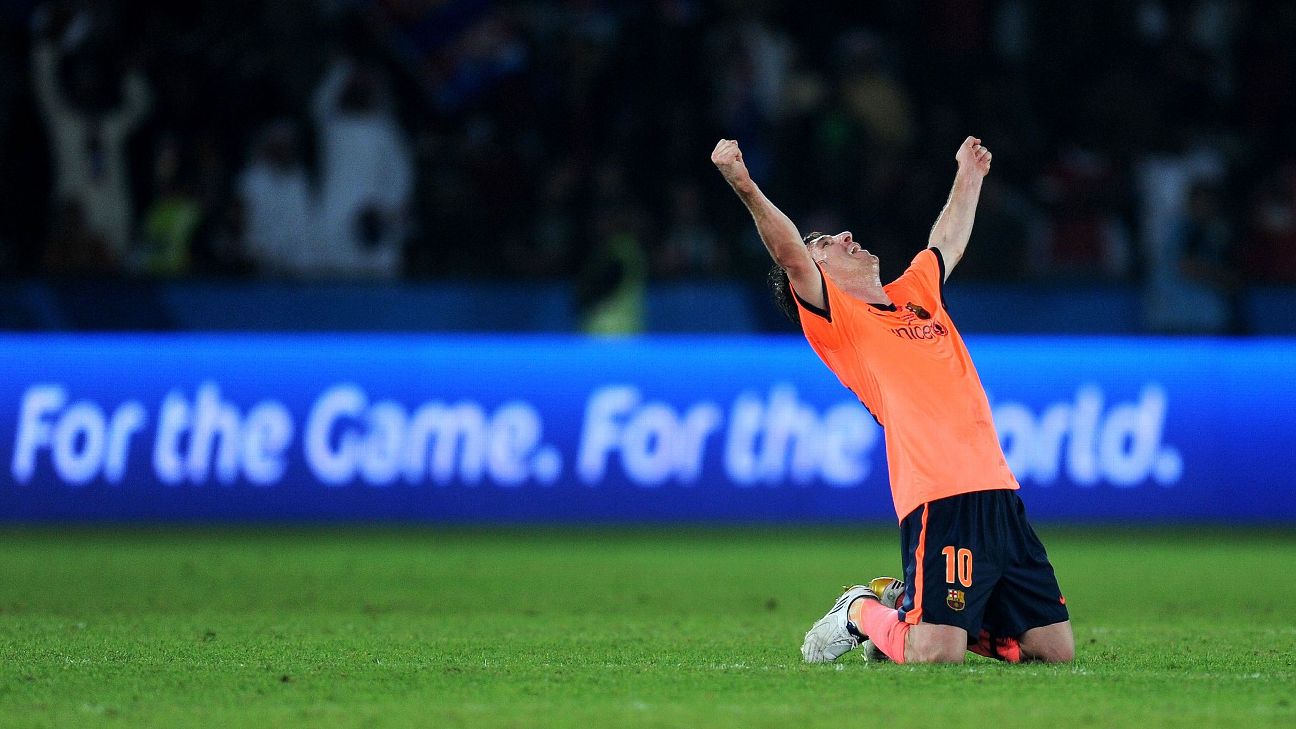
Alves: We were almost sent home in the semifinal. Afterwards, I swear to you, when we got to the final, I said that no one is taking this away from us.
Laporta: In 2006 we lost in Yokohama in Japan and we said that we would be back for [the Club World Cup] and we managed it. In Abu Dhabi, we managed it with a goal from Messi. It’s really illustrative that the best player in the history of the game scores the goal in the final and gave us the trophy we didn’t have to complete the sextet. An unequaled record. He scored the goal with his chest. And with the badge.
In the Copa del Rey, [Jose Manuel] Pinto saves a penalty in the semifinal against Mallorca. If he doesn’t save that, we don’t make the final — an extraordinary final against Athletic [which Barca won 4-1]. In La Liga, at the Bernabeu, if we don’t win that game 6-2, we also [would have] suffered. At Stamford Bridge, if not for the Iniestazo, we don’t reach the final in Rome. Of course luck had an influence. Only one team wins and we had the luck to win, to be champions and then to win everything…
Unzue: Obviously for anything to happen many circumstances have to coincide, but I think luck and coincidence only played a small part. We’re part of a game and there’s always that point of uncertainty which you can’t control. But there are key decisions which can take you closer to success.
Pedro: There was a lot of pressure [on Barcelona] but more stressful was [the fans’] expectation that we could win it. The final was really difficult, really competitive. Estudiantes set up for a really physical game. They played really well, above all in defence, and we struggled to find the breakthrough. They went ahead and it was really hard to turn it around. Luckily we were able to score with my header from Pique’s pass. For me, the Club World Cup was the culmination of everything that had happened in such a short space of time.
[Then Messi scoring the winner] was the culmination of an amazing period. We all know the player Leo is. We’re practically talking of the best player ever, of all time. And that he plays for Barça, that he’s won so many trophies on an individual and collective level and that he wins the trophy with that goal… For us, it was the best news. I don’t think there was a better way to seal it.
Juan Sebastian Veron was a legend for Argentina’s national team but also played much of his career in Europe, with stops at Manchester United, Lazio, Parma and Chelsea, before returning to his first club, Estudiantes, in 2007. He was on the losing team against Barca in that Club World Cup final.
Veron: Beyond the frustration, because you don’t think about the team you have in front of you as one of the best ever, you think about how close you were and the fact you were unable to get over the line. On the other hand, [Estudiantes] gave everything. It was an incredible game and beyond that frustration, we were satisfied because we’d done everything we’d planned: what the team felt, what the coach thought and what we had trained for.
The truth is that if you said to me today: ‘Would you play the game again?’ I would say no. Because, for me, we played the game we had to play. The result wasn’t the best in the end but in general we did everything we could to win that cup.
Alejandro Sabella was the manager of Estudiantes that day. He went on to coach the Argentina national team from 2011-14.
Sabella: We were close [to glory] but we were up against a team that’s maybe one of the best in the history of the game. But there’s also great satisfaction that we pushed them so far and that they only equalised with two minutes to go. Because two years later they played Santos and they scored four or five goals. Later they played River and they won 3-0. [Those results] add a little more value to what this group of players did.
